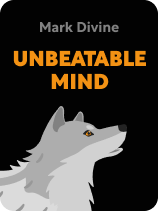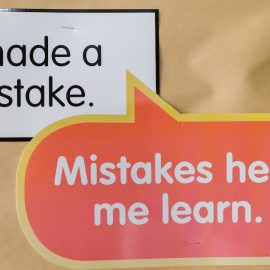

This article is an excerpt from the Shortform book guide to "Unbeatable Mind" by Mark Divine. Shortform has the world's best summaries and analyses of books you should be reading.
Like this article? Sign up for a free trial here.
Looking for an overview of Mark Divine’s Unbeatable Mind? What are the book’s main points and advice?
In Unbeatable Mind, Mark Divine offers a guide to training your mind to be stronger so that you have control over your whole self. Divine is a retired Navy SEAL Commander with the goal of creating millions of powerful leaders over the next two decades.
Read on for a brief overview of Mark Divine’s Unbeatable Mind book.
Unbeatable Mind
In Unbeatable Mind, Mark Divine offers a guide for developing a warrior mindset that allows you to reach your full potential as a person and then apply that to improving your life and the lives of others. Divine writes that developing the mental toughness of an unbeatable mind means mastering five levels of personal development by cultivating character traits that maximize your personal and interpersonal abilities, focusing your mind on your true purpose as a human and then working toward that purpose, and training your body and mind through breathing exercises and meditative practices.
Divine is a retired Navy SEAL Commander and best-selling author of other books devoted to holistic training such as Staring Down the Wolf and The Way of the SEAL. His techniques are based in such systems as CrossFit training, Ashtanga yoga, Saito Ninjitsu, and Seido Karate.
Mark Divine’s Five Plateaus
According to Mark Divine, you can cultivate an unbeatable mind by learning to navigate five levels of personal development, which he refers to as plateaus. He links each level to one of five different intelligences characterized by a specific type of human functioning: Physical intelligence relates to surviving, emotional intelligence relates to protecting, mental intelligence relates to achieving, intuitive intelligence relates to equalizing, and holistic intelligence relates to integrating.
(Shortform note: There are other theories of multiple intelligences, most of which derive from the eight intelligences described by John Gardner. Gardner’s theory includes things like bodily-kinesthetic intelligence, which could be linked to Divine’s description of physical intelligence, and interpersonal intelligence, which could relate to Divine’s emotional intelligence, but Gardner describes several others that don’t fit into Divine’s framework, such as musical intelligence and linguistic intelligence. Gardner also rejected the addition of things like spiritual intelligence, which may contrast with Divine’s theory of intuitive and holistic intelligence.)
These levels build upon each other, but they’re not hierarchical in the sense that it’s “better” or “worse” to be operating at one level than another. Further, reaching level 4 doesn’t mean that you’ll never again operate at or use the skills developed at level 1. As you ascend through the levels, you’ll continue to use the previous ones to guide you and inform your development.
Level 1: Surviving
The first level in Unbeatable Mind that Mark Divine discusses is about survival. When you’re at this level, you’re devoting the majority of your time and energy to getting your basic survival needs met. You’re making choices based largely on instinct.
(Shortform note: Acting on instinct can be dangerous but also has its benefits. In Relentless, Tim Grover suggests that acting instinctively pushes out distractions like self-doubt that may otherwise interfere with your decision-making, and he suggests that you can train your instincts to help you make the best decisions without having to stop and think about them.)
In this stage, you focus on yourself and possibly a small circle of loved ones, and you ignore people outside of that circle. You can develop behaviors that are damaging in the long term, including abuse of others or of yourself in the case of substance abuse or self-harm.
Divine offers the following tips for getting through level 1:
Take on an abundance mindset: Understand that there’s enough to go around and that you don’t need to be focused on getting “enough” for you and yours. (Shortform note: Studies show that most crime is motivated by poverty, or the inability to meet your survival needs. An abundance mindset requires actual abundance in a person’s life, which is not entirely in their control.)
Hold yourself responsible and accountable: When you take responsibility for both yourself and your team (and hold yourself accountable when you fail to meet your responsibilities), you’ll expand your sense of self to include others and gain the trust of those around you.
(Shortform note: In The Oz Principle, Roger Connors, Tom Smith, and Craig Hickman also emphasize the importance of being responsible and accountable in gaining the trust of others, and they go on to suggest that accountability is one of the biggest keys to success.)
Stay determined: Understand that every day is a battle. Stay in the present moment and keep driving forward through hardship.
(Shortform note: Staying in the present moment can keep you focused on your current situation, but it can also prevent certain types of anxiety that may hold back your progress, such as catastrophizing about the future or ruminating on the past.)
Level 2: Protecting
According to Mark Divine’s Unbeatable Mind, once you’ve met your survival needs and successfully processed the emotions involved, you’ll be able to tackle level 2. This level is where you’re acting (in your mind) as the guardian for your group or a specific structure or way of life. At this stage, Divine says, your choices are based on deeply rooted biases or unexamined emotions. It’s easy to get stuck here if you aren’t exposed to—or if you refuse to consider—perspectives or beliefs different from your own.
(Shortform note: Certain types of ideology such as tribalism and nationalism derive from level 2. These kinds of ideas elevate certain groups of people over others and can cause social issues such as bigotry and large-scale conflicts—including warfare—that can be devastating on a micro and macro level.)
Level 3: Achieving
Once you’re secure in your survival and belief system, you’ll move on to level 3. At this level, Divine says, you’re striving to improve your life through accomplishment. You’re making choices based on logic and hard evidence, and you may dismiss ideas that are not possible or easy to “prove.”
(Shortform note: The idea of relying only on scientific or provable evidence can be comforting, but scientists have pointed out that science is not as objective as we would like to believe, and that the beliefs of the people who are establishing this scientific evidence can influence the results. If you base your beliefs on “provable” scientific evidence, your beliefs will still be subjective, which may be frightening to someone at level 3.)
The dangers of this level are that when you focus only on achievement, you risk becoming a workaholic and experiencing stress from over-work, as well as prioritizing your gain over the greater good of humanity or the planet.
(Shortform note: Success through achievement is extremely tempting, but as Divine points out, it can come at the expense of others’ well-being. Billionaires are an example of almost unimaginable success, but researchers have suggested that the means they often use to achieve that success can have such consequences as causing catastrophic climate change or severe mistreatment of workers for the sake of higher productivity.)
Level 4: Equalizing
Once you’ve met your survival needs, expanded your perspective beyond yourself, and begun to seek equity over material gain, you’ll reach level 4. At this level, Divine explains, you’re devoted to the ideals of equity and creating a world built for everyone. You’ll work to advocate for policies or actions that elevate those at the bottom and bring those at the top down to an equal level.
(Shortform note: In Unbeatable Mind, Mark Divine uses the word “equality” instead of “equity,” but the principles he addresses, such as making changes that bring people to the same level, actually match up more closely with the definition of “equity.” Experts point out that “equality” means treating everyone the same way, but this only works if everyone is already on a level playing field. The solution to inequality is actually equity—giving everyone what they need—and only after that can we implement equality—treating everyone exactly the same.)
The drawbacks of this stage are that focusing only on strict equality can lead you to feel envy toward others who have more, to overcompensate in areas of social justice, or to exclude people with different perspectives.
Level 5: Integrating
This level is the amalgamation of the strengths, values, and skills of all four previous levels. At this stage, your mind is in control of your self rather than the other way around.
In Unbeatable Mind, Mark Divine explains that at this stage, you’ve taken on a holistic view of the self, humanity, the earth, and the cosmos. Though you may still experience negative thoughts and emotions, you’re aware of them and work toward eliminating them. You’re courageous, compassionate, generous, forgiving, and loving.
(Shortform note: Putting your mind in control of the self means having agency over your own thoughts and actions. Because of the way the brain matures, this is difficult or impossible for children under a certain age, and like many of the traits Divine espouses, becomes easier when we enter adulthood.)
Integrating the first four plateaus can have some negative consequences when one of them begins to dominate. Focusing too much on self-growth can cause other things to fall by the wayside. For example, if you commit too intensely to the belief that everyone is equal, it can lead you to view everyone as “perfect,” and you risk being taken advantage of by others. Also, if you focus too much on spiritual attainment, you may begin to feel detached from reality.
(Shortform note: It’s important to maintain balance in your integration of the four levels. You should try to avoid becoming overly fixated on personal development to the point that it interferes with other aspects of your life or leads to obsession, self-doubt, and conflict in your relationships.)
While the goal is for you to operate mainly from the fifth level, Divine explains that you won’t eliminate the other four, but instead will become aware of how to integrate them into your life or behavior as needed. Sometimes you’ll be operating at different levels in different areas of your life, like if you feel you’re achieving what you want in your marriage but feel like you’re in survival mode at work.
| What You Need to Grow Mark Divine’s five levels in Unbeatable Mind align in some ways with Maslow’s hierarchy of needs. Maslow’s hierarchy is a psychological model depicting the five different types of needs humans have, listed in the order in which they need to be met. Maslow’s first level of needs is physiological, or survival needs, which aligns with Divine’s suggestion that you must meet your body’s basic needs to pursue personal growth. Maslow’s second level is the need for safety, which comes from society and the people around you, and his third level is the need to be loved and to belong. These two together correspond to Divine’s second level, which is about forming close bonds with others and working to keep them safe. Maslow’s fourth level, the need for self-esteem and the respect of others, corresponds to Divine’s third level, as both are related to working toward achievement in your life. Maslow’s fifth level, the need for self-actualization, could apply to Divine’s fourth and fifth levels together, as all three are about striving to be the best person possible in every facet of your life. Unlike Divine’s levels, Maslow’s levels are mostly eliminated as you move up the hierarchy. Once a deficient need is met, it goes away and you can focus fully on your next need. |
Exercise: Move to the Next Level
Right now in your life, you are primarily operating at one of the five levels of development Mark Divine identified in Unbeatable Mind (surviving, protecting, achieving, equalizing, or integrating). In this exercise, you’ll assess where you are now and see what it would take to push you into the next level.
- First, ask yourself which level you’re at right now. What are you focused on in life? Who is included in that focus? What are you striving for the most? Which level do your focus and aim correspond to?
- Next, think about what disciplines and values you may be lacking. Which ones could you incorporate further into your life, and what goal are they oriented toward?
- Now, think of what steps you could take to move to that next level. Pick one discipline or value and ask how you can implement it in your daily life. What’s one change you can make that will push you toward the next level?

———End of Preview———
Like what you just read? Read the rest of the world's best book summary and analysis of Mark Divine's "Unbeatable Mind" at Shortform.
Here's what you'll find in our full Unbeatable Mind summary:
- Advice from a former Navy SEAL on how to maximize your success
- Tools for training your mind and developing mental toughness
- Why you should come up with a mantra for yourself






